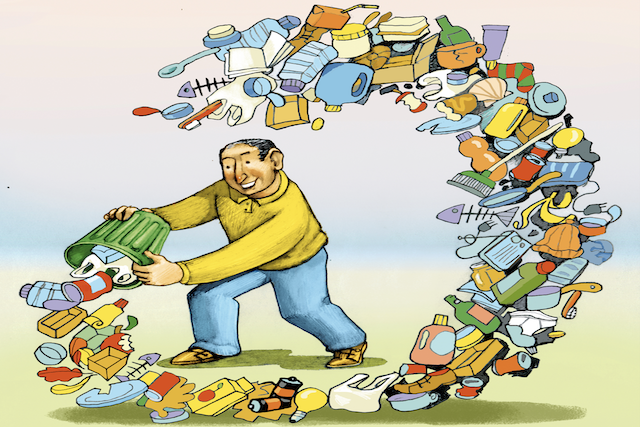“No one can stand in these solitudes unmoved, and not feel that there is more in man than the mere breath of his body.”
Emirates has done it once again and in its own exclusive fashion to defy all odds that are usually unprecedented from all accounts. This time, it is in news for launching the NFTs in the Metaverse.
The post Launching NFTs in Metaverse: A new feat of Emirates appeared first on Enterprise Podcast Network – EPN.

“Not what we have but what we enjoy constitutes our abundance.” ~Epicurus
Minimalism is the lifestyle of removing the clutter from one’s life to make room for meaningful living. This can be in the form of paring down the stuff …
The post Exploring Minimalism: Why Getting Rid of Stuff Won’t Make You Happy appeared first on Tiny Buddha.
This article will explore more about the significance of an eCommerce dashboard and why you need it too.
The post 5 Best Examples of eCommerce Dashboards to Help You Take Control of Your Business appeared first on Entrepreneurship Life.
On the value of remaining resolutely what you are.

“There are two things you should never waste your time on: things that don’t matter and people who think that you don’t matter.” ~Ziad K. Abdelnour
“What is wrong with me?” I asked myself. Crying in the dark of the …
The post How I Stopped Chasing Men Who Hurt Me and Found Healthy Love appeared first on Tiny Buddha.
John Feloni, the Founder and CEO of Stock Squirrel, Inc., a new FinTech that democratizes stock ownership joins Enterprise Radio. His new book is The Covenant Secret: An Inspirational Tale About Uncovering the 7 Master Keys of Wisdom and Wealth.
The post The 7 Covenant Principles: Your Key to Great Relationships appeared first on Enterprise Podcast Network – EPN.

The U.S. needs to return to the kind of economic and productivity growth it saw in mid-20th century to boost public spirits, according to a Nobel Prize-winning economist.
“We badly need to get back to economic growth,” Edmund S. Phelps, director of the Center on Capitalism and Society at Columbia University, told CNBC’s “Squawk Box Europe” on Wednesday.
“By that I don’t mean an artificial temporary boom or a slower descent into lower employment, I mean that we’ve really got to get productivity growth on an upward climb approaching what it was in the 50s and 60s,” he said.
Phelps was awarded the 2006 Nobel in Economic Sciences for his work challenging the Phillips Curve, the view, popular in the 1950s and 60s, that the price for reduced unemployment was a one-time increase in inflation.
Phelps introduced the factor of inflation expectations into the Phillips Curve, showing unemployment is determined by the functioning of the labor market rather than inflation figures, so a stabilization policy can only diminish short-term fluctuations in unemployment.
“A lot of people listening to this program might think, well gee whiz, after centuries of rapid growth, haven’t we had enough? We’re not starving anymore after all, what’s all this fuss about economic growth?” Phelps told “Squawk Box Europe.”
“But I think it’s really important for people’s morale that they come home from time to time with better pay checks than they had before. It boosts their morale, it makes them less worried about how they’re doing compared with other people,” he continued.
“When everybody is doing so-so, when you’re in virtual stagnation in terms of productivity, in that landscape, which we’re unfortunately in now, it’s really important that we get the growth rate up.”
U.S. GDP fell 0.9% in the second quarter following a 1.6% drop in the first quarter, though analysts say the economy is not yet in a recession and may avoid one.
Productivity, measured as nonfarm business employee output per house, also fell in both quarters, decreasing by 7.4% and 4.6% quarter-on-quarter.
These were the weakest back-to-back readings since records began in 1947.
The U.S. recorded productivity growth of 2.8% from 1947-1973, which fell to 1.2% from 1973-1979, according to data from the U.S. Bureau of Labor Statistics.
Productivity growth has failed to return to its post-war level since, coming in at 1.4% from 2007-2019 and 2.2% from 2019-2021.
On current economic pressures, Phelps commented: “The government has been running huge fiscal deficits in recent years, and as a result the public debt has risen to sky-high levels. To me, it’s just unimaginable that fiscal policy would be used at this point to create further stimulus to demand.
“I think we need to have somewhat lower demand to cool off the economy a bit and get the unemployment rate back to some sustainable level.”
Natural market forces will slow the rate of inflation over several years, he said, but the Federal Reserve must be more aggressive than it has been and signal a willingness to continue to act in strong magnitudes.
Get CyberSEO Lite (https://www.cyberseo.net/cyberseo-lite) – a freeware full-text RSS article import plugin for WordPress.
Starting a business in the UK can seem like a very attractive option. However, to achieve this, non-UK entrepreneurs would have to jump through additional legal hoops apart from the already existing registration, licence, employment, and tax regulations that every company must comply with.
The post How to Start a Business as an Immigrant in the UK appeared first on Entrepreneurship Life.
“The reality is always there, and it is preceded by vision. And if one keeps looking steadily the vision crystallizes into fact or deed. There is no escaping it. It doesn’t matter what route one travels.”
